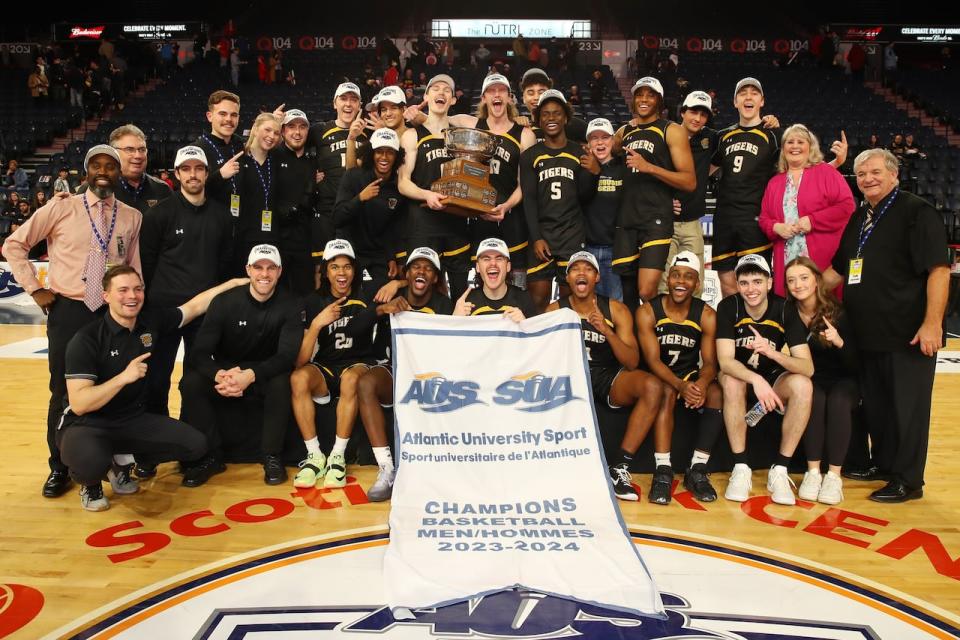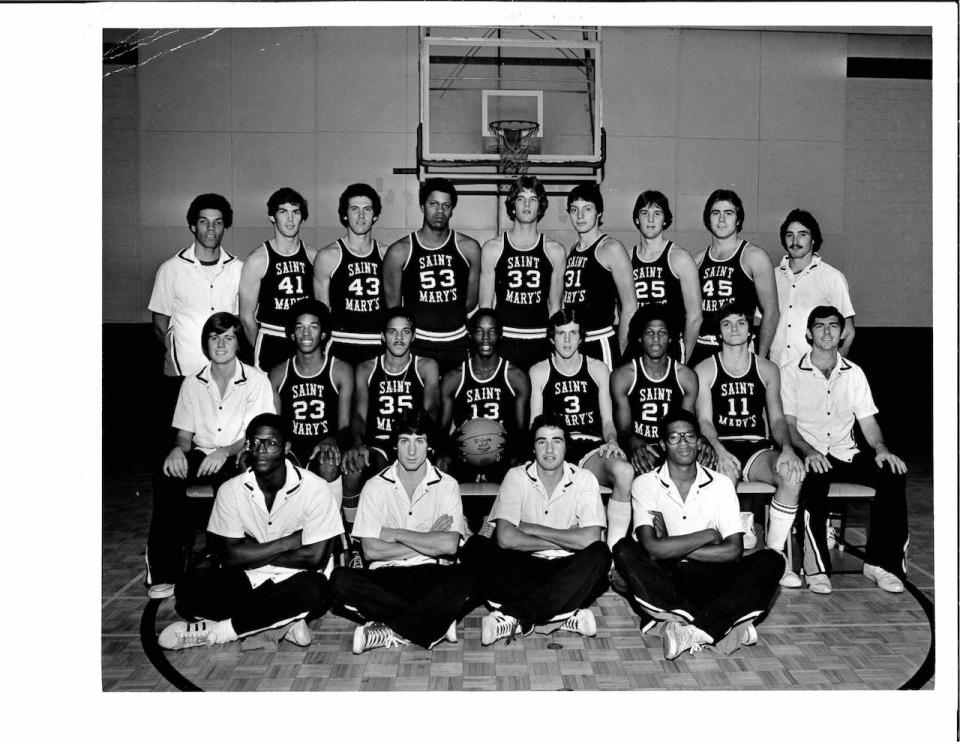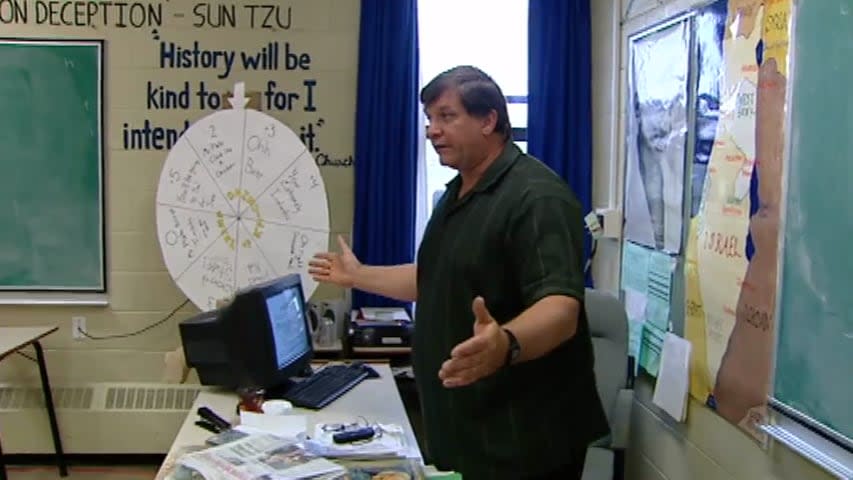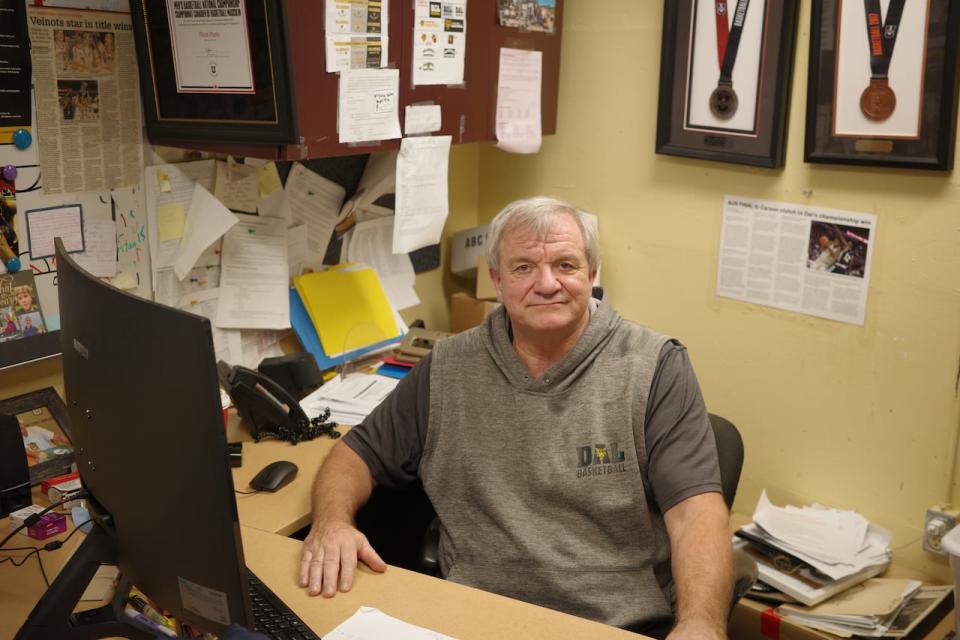How this former teacher preaching The Art of War built a university basketball dynasty

In his 11 years as head coach of the Dalhousie University men's basketball team, Rick Plato has been uncommonly successful.
Since joining the program in 2013, his teams have won seven of the last nine Atlantic University Sport championships. The Tigers have won a silver medal and a bronze medal at the nationals over that stretch.
After defeating Brock University 68-51 in the opening round of the U Sports Final 8 in Quebec City on Friday, Dalhousie will play Laval in the semifinals Saturday evening.
But long before he was the team's head coach, Plato was a teacher known for his exacting standards. His success as a coach owes a lot to some of his teaching methods.

Plato's Dalhousie Tigers men's basketball team won the AUS championship last month. (Atlantic University Sport)
For 27 years, he taught history, political science and economics to students at Charles P. Allen High School in Bedford, N.S., where he was probably feared and loved in equal measure.
He was known for the high expectations he placed on his students and his burning passion for the subjects he taught, which covered everything from the horrors of the Holocaust and Vietnam War, to the founding of our economic system and the origins of political thought and democracy.
"I was a challenging teacher, I was a demanding teacher, and with a name like Plato, I better have a number of philosophies and sayings that I live by," he said this week from his office as he prepared for the national championship tournament.
His players, like his former students — I was one of them in 2009 — are familiar with those standards and his penchant for soliloquies, evidenced in part by his frequent invocation of an ancient text first published thousands of years ago — Sun Tzu's The Art of War.
According to them, there's one Tzu quote in particular Plato is fond of repeating: "Know yourself. Know your enemy."
As a coach, he demands from his players what he always expected of his students: hard work, respect and discipline. He's not afraid to let you know if you fail to measure up to these ideals.
"As soon as you step on the court, he will sniff out the guys who aren't ready to play," says captain Nginyu Ngala, in his third season playing for the Tigers. "But if you want to be coached hard ... play hard for your teammates ... he just preaches what it is to do things the right way, not just on the basketball court, but in life in general."
Discipline is everything, says Plato
Tacked up behind Plato's desk at Dalplex is a handwritten note that reads: "Expectation without effort is entitlement."
It's something he preaches to his athletes — even as he acknowledges that his focus on individual responsibility may seem old fashioned to some.
"That's one of my big bugaboos," he said. "I tell my guys … they're owed nothing."
His demands in the classroom were similar.
Students who ran afoul of his rules might be forced to spin "The Wheel of Ding' — a handmade object that threatened a full-range of punishments, including — perhaps most frighteningly — being forced to stand in front of the class and cluck like a chicken.
That is, unless students brought him a large black coffee, in which case they'd live to see another day.
"It was all part of just having fun and being on time ... and holding the kids accountable," he said. "I'm sure there were some people and parents who didn't like the wheel, but it worked."

Plato won two national championships playing for Saint Mary's University in the 1970s. (Nova Scotia Sport Hall of Fame)
But this emphasis on accountability, Plato reasons, isn't for nothing.
"You have to challenge your students or your players, and take them out of their comfort zone so that they learn to deal with adversity," he said.
His methods aren't for everyone, he admits, but they have undeniably contributed to Dalhousie's success on the court.
"He holds players to a really high standard and I think those high standards are a large part of the success that he's had," said Sam Maillet, a fellow team captain, in his fourth year on the team.
Former athlete at Saint Mary's
Plato comes by his emphasis on hard work honestly.
He grew up near Niagara Falls on a farm in Ridgeway, Ont. with four younger sisters, a father who worked two jobs, and a mother who took care of them all.
"You just learn what hard work is and there's no substitute for it," he said. "Entitlement ... it's not my DNA."
He first came to Nova Scotia in 1976 after being recruited by coach Brian Heaney to play basketball at Saint Mary's University.
Known for his tenacity on the floor, he was a part of a team that won two national championships, including one in 1978 before a packed house at a brand-new Halifax Metro Centre.

Plato speaks to his students at Charles P. Allen high school in this file photo from 2009. (CBC Archives)
After graduating, he made Nova Scotia his permanent home.
For 25 years, he taught high school in the day and spent his nights coaching the men's team at Mount Saint Vincent University, leading them to 14 appearances at the Canadian Colleges Athletic Association national championships.
But it wasn't until 2013, when he retired from teaching, that he finally made coaching his full-time job at Dalhousie.
The decision didn't come without at least one major reservation.
For decades, he was loyal to Saint Mary's, and sneered at students who told him they'd decided to study at Dalhousie after high school with the simple taunt: Dal-lousy.
He remembers one email he received, shortly after the news was announced, from a former student doing a co-op in Ecuador, who teased him over his about-face.
"I had to eat crow on that one, I'll tell you," he said.
Going for gold
His wife, Andrea, is Dalhousie's manager, as she has been since his days at MSVU, handling everything from the logistics of booking travel, team statistics, and cooking meals for the athletes.
Both of them have devoted much of their lives to the sport, but he calls Andrea the unsung hero of his teams.
Many of his former players have grown to be like sons, Plato said, and he delights in hearing about their exploits off the court, readily naming dozens who have gone on to achieve success after graduation.

Plato sits behind his desk at the Dalhousie University's athletic centre. (Andrew Sampson/CBC)
All these years into his career, however, there's one accolade that's eluded him.
He glances behind his desk at two plaques, commemorating medals he won at national championships in 2017 and 2020.
"I got a bronze there. I got a silver there, but we're missing a gold, so hopefully, knock on wood, we will take care of business this year."
MORE TOP STORIES


